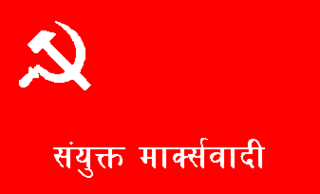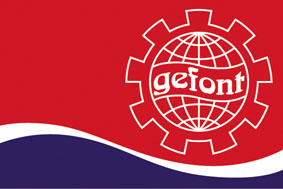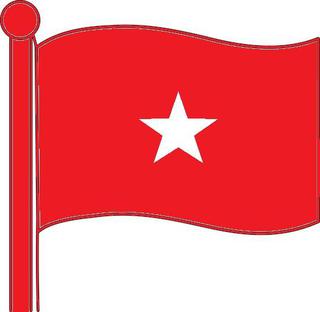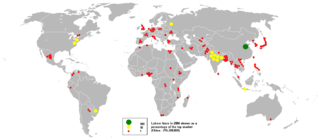
The General Confederation of Labour is a national trade union center, founded in 1895 in the city of Limoges. It is the first of the five major French confederations of trade unions.

The Communist Party of Nepal (Unified Marxist–Leninist) (Nepali: नेपाल कम्युनिष्ट पार्टी (एकीकृत मार्क्सवादी-लेनिनवादी), romanized: nēpāl kamyuniṣṭ pārṭī (ēkīkṛt mārksavādī-lēninavādī); abbr. CPN (UML)) is a communist political party in Nepal. The party emerged as one of the major parties in Nepal after the end of the Panchayat era.

The Communist Party of Nepal , abbreviated CPN (UC–M) was an underground communist party in Nepal. The CPN (UC–M) was formed in 2002 through the merger of Communist Party of Nepal and Communist Party of Nepal (Masal).

The Communist Party of Nepal (Marxist) was a Nepalese political party. It was formed on 1 November 1991 by a group of former leaders of the original Communist Party of Nepal (Marxist) that had been expelled from the Communist Party of Nepal (Unified Marxist–Leninist). Initially, it was known as the Communist Party of Nepal (15 September 1949) but took the name Communist Party of Nepal (Marxist) after approximately one year of existence. Prabhunaryan Chaudhary was the chairman of the party.
Labour unions emerged in Japan in the second half of the Meiji period, after 1890, as the country underwent a period of rapid industrialization. Until 1945, however, the labour movement remained weak, impeded by a lack of legal rights, anti-union legislation, management-organized factory councils, and political divisions between “cooperative” and radical unionists.

The Communist Party of Nepal (United Marxist) was a political party in Nepal existing from 2005 until 2013.

Democratic Confederation of Nepalese Trade Unions (DECONT) was a central trade union organization in Nepal. DECONT is politically tied to the Nepali Congress (Democratic). The president of DECONT was Rajendra Bahadur Raut.

The Hind Mazdoor Sabha (HMS) was formed by the Socialists in 1948 but has little real connection with the Socialist Party. It is one of the least political and most pragmatic trade-union federations in India. The HMS is affiliated with the International Confederation of Free Trade Unions.

The General Federation of Nepalese Trade Unions (GEFONT) is a confederation of 20 national trade union federations. It is politically tied to the Communist Party of Nepal. GEFONT declares its goal to be "Socialism for the dignified working-class and prosperous life".
The Nepal Independent Hotel Workers Union (NIHWU) is a Nepalese trade union formed in 1981. The union existed as a separate entity until 1989 when it helped form the General Federation of Nepalese Trade Unions.

The Independent Transport Workers Association of Nepal (ITWAN) was a Nepalese trade union formed in 1979. The union existed as a separate entity until 1989, when it helped form the General Federation of Nepalese Trade Unions.
The Nepal Trade Union Congress (NTUC) a national trade union center in Nepal. Founded in 1947, it was the first and largest trade union confederation in country. The NTUC is politically linked with the Nepali Congress (NC).
Trade unions in South Africa has a history dating back to the 1880s. From the beginning unions could be viewed as a reflection of the racial disunity of the country, with the earliest unions being predominantly for white workers. Through the turbulent years of 1948–1991 trade unions played an important part in developing political and economic resistance, and eventually were one of the driving forces in realising the transition to an inclusive democratic government.
Trade unions in Benin operate in relative freedom, with approximately 75% of the formal sector being unionized. There are, however, concerns expressed by the International Labour Organization (ILO) and the International Trade Union Confederation (ITUC) about the discrepancies between the government's Labour Code and the labour practices outlined by ILO Conventions 87 and 98 - specifically the right of unions to form without government approval, the right of seafarers to organize or strike, and restrictions on strikes.
Trade Unions in Botswana operate within a longstanding democratic system in which the government of Botswana has ratified the International Labour Organization's core conventions, including Conventions 87 and 98.
The Trade Union and Labour Party Liaison Organisation (TULO) is a labour organisation in the United Kingdom that was set up in 1994 by a motion to the Labour Party's Annual Conference. It had several forerunning organisations that coordinated trade union support for the Labour Party at election times such as Trade Unions for a Labour Victory and Trade Unionists For Labour. TULO is different in that, as a more formal organisation, it serves the dual purposes of not only coordinating trade union support for the Labour Party at elections, but also of acting as the channel of communication between the Party Leadership and its affiliated trade unions.

The Bolshevik Party of India is an Indian political party in India. The party was founded in 1939. The party had a certain role in the trade union movement in West Bengal and was briefly represented in the state government in 1969. In later years the party has played a negligible role in Indian politics.

The ICFTU Asia and Pacific Regional Organisation (APRO) was a regional organisation of the International Confederation of Free Trade Unions (ICFTU), representing trade unions from countries in Asia and Oceania.
Trade unions in Pakistan are regulated under provincial industrial relations acts. Under the Constitution of Pakistan, labour is considered a shared responsibility of the federal and provincial governments. The latest Industrial Relation Act was promulgated on 12 March 2012 by President of Pakistan. National Industrial Relations Commission (NIRC) was established under Labour Policy, 1972 as a quasi-judicial authority to promote genuine trade unionism, setting up industry-wise federations of unions and at the national levels. According to NIRC, in 2016 there were 1,390 trade unions with registered 1.4 million members. There are 16 registered federations and the ratio of total union members to total employment is 2.2%.

Nepal has a labour force of 16.8 million workers, the 37th largest in the world as of 2017. Although agriculture makes up only about 28 per cent of Nepal's GDP, it employs more than two-thirds of the workforce. Millions of men work as unskilled labourers in foreign countries, leaving the household, agriculture, and raising of children to women alone. Most of the working-age women are employed in the agricultural sector, contributions to which are usually ignored or undervalued in official statistics. Few women who are employed in the formal sectors face discrimination and significant wage gap. Almost half of all children are economically active, half of which are child labourers. Millions of people, men, women and children of both sexes, are employed as bonded labourers, in slavery-like conditions. Trade unions have played a significant role in bringing about better working conditions and workers' rights, both at the company level and the national government level. Worker-friendly labour laws, endorsed by the labour unions as well as business owners, provide a framework for better working conditions and secure future for the employees, but their implementation is severely lacking in practice. Among the highly educated, there is a significant brain-drain, posing a significant hurdle in fulfilling the demand for skilled workforce in the country.












